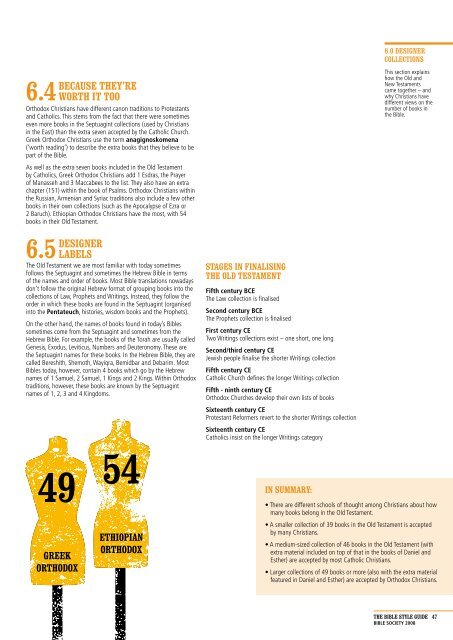BiBle STyle Guide - Get a Free Blog
BiBle STyle Guide - Get a Free Blog
BiBle STyle Guide - Get a Free Blog
You also want an ePaper? Increase the reach of your titles
YUMPU automatically turns print PDFs into web optimized ePapers that Google loves.
6.4<br />
BecaUse they’re<br />
worth it too<br />
Orthodox Christians have different canon traditions to Protestants<br />
and Catholics. This stems from the fact that there were sometimes<br />
even more books in the Septuagint collections (used by Christians<br />
in the East) than the extra seven accepted by the Catholic Church.<br />
Greek Orthodox Christians use the term anagignoskomena<br />
(‘worth reading’) to describe the extra books that they believe to be<br />
part of the Bible.<br />
As well as the extra seven books included in the Old Testament<br />
by Catholics, Greek Orthodox Christians add 1 Esdras, the Prayer<br />
of Manasseh and 3 Maccabees to the list. They also have an extra<br />
chapter (151) within the book of Psalms. Orthodox Christians within<br />
the Russian, Armenian and Syriac traditions also include a few other<br />
books in their own collections (such as the Apocalypse of Ezra or<br />
2 Baruch). Ethiopian Orthodox Christians have the most, with 54<br />
books in their Old Testament.<br />
6.5 designer<br />
laBels<br />
The Old Testament we are most familiar with today sometimes<br />
follows the Septuagint and sometimes the Hebrew Bible in terms<br />
of the names and order of books. Most Bible translations nowadays<br />
don’t follow the original Hebrew format of grouping books into the<br />
collections of Law, Prophets and Writings. Instead, they follow the<br />
order in which these books are found in the Septuagint (organised<br />
into the Pentateuch, histories, wisdom books and the Prophets).<br />
On the other hand, the names of books found in today’s Bibles<br />
sometimes come from the Septuagint and sometimes from the<br />
Hebrew Bible. For example, the books of the Torah are usually called<br />
Genesis, Exodus, Leviticus, Numbers and Deuteronomy. These are<br />
the Septuagint names for these books. In the Hebrew Bible, they are<br />
called Bereshith, Shemoth, Wayiqra, Bemidbar and Debarim. Most<br />
Bibles today, however, contain 4 books which go by the Hebrew<br />
names of 1 Samuel, 2 Samuel, 1 Kings and 2 Kings. Within Orthodox<br />
traditions, however, these books are known by the Septuagint<br />
names of 1, 2, 3 and 4 Kingdoms.<br />
49<br />
greek<br />
orthodox<br />
54<br />
ethiopian<br />
orthodox<br />
stages in finalising<br />
the old testament<br />
Fifth century bce<br />
The Law collection is finalised<br />
second century bce<br />
The Prophets collection is finalised<br />
First century ce<br />
Two Writings collections exist – one short, one long<br />
second/third century ce<br />
Jewish people finalise the shorter Writings collection<br />
Fifth century ce<br />
Catholic Church defines the longer Writings collection<br />
Fifth - ninth century ce<br />
Orthodox Churches develop their own lists of books<br />
sixteenth century ce<br />
Protestant Reformers revert to the shorter Writings collection<br />
sixteenth century ce<br />
Catholics insist on the longer Writings category<br />
in sUmmary:<br />
6.0 deSiGner<br />
collecTionS<br />
This section explains<br />
how the Old and<br />
New Testaments<br />
came together – and<br />
why Christians have<br />
different views on the<br />
number of books in<br />
the Bible.<br />
• There are different schools of thought among Christians about how<br />
many books belong in the Old Testament.<br />
• A smaller collection of 39 books in the Old Testament is accepted<br />
by many Christians.<br />
• A medium-sized collection of 46 books in the Old Testament (with<br />
extra material included on top of that in the books of Daniel and<br />
Esther) are accepted by most Catholic Christians.<br />
• Larger collections of 49 books or more (also with the extra material<br />
featured in Daniel and Esther) are accepted by Orthodox Christians.<br />
The <strong>BiBle</strong> <strong>STyle</strong> <strong>Guide</strong> 47<br />
bible society 2008


